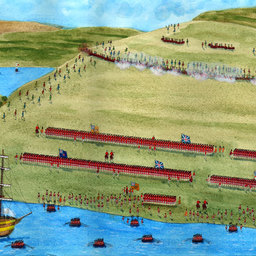So, this is the current system for a particular troop movement scenario, as far as I can tell. If you move a transport to a sea zone that is adjacent to two territories, and try to pick up one unit from each territory then land them both on another, if one of the units is attacked on land, or blocked by air, it will obviously not be picked up, but also the 'mission' of the transport is aborted - it will not carry the piece it did pick up and to the drop off point, even if the point is a third adjacent territory.
I think it would make sense for the transport to perhaps stay still for a turn if unable to lift a piece that becomes blocked on land, or perhaps to immediately skip to the next move in its queue, but, to certainly carry out the rest of its mission even if a piece on land was blocked.
-
Les Transports
-
Also note, if a transport is blocked at sea it will still pick up the unit(s) it was attempting to as long as the transport is adjacent to the land zone with the unit(s) to be picked up, even if the transport is not in the sea zone that it was going to pick the units up from (i.e. if the land zone is adjacent to more than one sea zone and the transport does not make it to the sea zone it was trying to get to before picking up the unit(s) it will still pick up the unit(s) as long as it is blocked in another sea zone adjacent to the land zone). By logic that makes this so I would say that you make a good point.
-
Not sure if Mambas suggestion would always be desired. It could result in carrying out an attack with drastically reduced forces.
It might be better to hold back and ensure all that was expected to go was ready to go. As it does now.
-
I don't see how that would be much different from blocking transports and having someone make an all aircraft invasion (usually suffering high $ casualties), or blocking a transport mid unloading to have only half the desired units land. I'm not saying that this is something that needs to be changed, but I am saying that, based on the example I gave above, the suggestion has some merit,
-
I see your point Sphynx, but, I don't see how a scenario where the player is disadvantaged due to the hypothetical alteration negates the potential benefits the alteration may provide in another sort of scenario. Every game mechanic of this nature provides benefits and disadvantages. To say that a suggested alteration to a particular game mechanic is not worth consideration because it may also provide a disadvantage is simultaneously proving my point that the current mechanic ought to be looked at because it has its own disadvantages, as demonstrated in the example scenario. But this is demonstrative of a fundamental flaw in your powers of reason and logic rather than an argument for or against an alteration to the transport system.
I considered an advanced function where these particulars can be hand picked by the player, as an option when sending a transport on a mission, where if the option is not opted for, the 'default' mechanic is initiated. This would provide a further advantage to the more 'experienced' players, and, despite the benefits it could provide to the game, is outweighed by the negatives associated with its complexity.
But that said, I'd be ok with dealing with this complexity, but I do think it could also be an unfair advantage.
So if the system changed entirely, would it be better or worse than the current system? There is no way to find a definitive answer because it really depends on individual playing styles, but, if the system was different, odds are that Anap's capital would have burned to the ground while I sat back and sipped his blood from a wine glass, instead, he is dying slowly while I throw the game to Cadesues just so I can watch Anap burn from the front lines.

